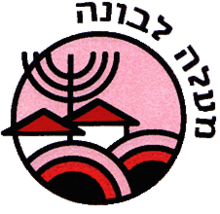Ma'ale Levona
Ma'ale Levona מַעֲלֵה לְבוֹנָה | |
|---|---|
| Hebrew transcription(s) | |
| • unofficial | Maaleh Levonah |
 | |
| Coordinates: 32°03′16″N 35°14′27″E / 32.05444°N 35.24083°E | |
| District | Judea and Samaria Area |
| Council | Mateh Binyamin |
| Region | West Bank |
| Affiliation | Amana |
| Founded | 1983 |
| Population (2022)[1] | 1,018 |


Ma'ale Levona (Hebrew: מַעֲלֵה לְבוֹנָה, lit. Ascent of Frankincense) is an Israeli settlement organized as a community settlement in the West Bank. Located to the south-east of Ariel, it falls under the jurisdiction of Mateh Binyamin Regional Council. In 2022, it had a population of 1,018.
According to the ARIJ, land from the neighboring Palestinian villages of Sinjil, Al-Lubban ash-Sharqiya, and Abwein were confiscated to build the settlement. The international community considers Ma'ale Levona and other Israeli settlements in the West Bank illegal under international law. However, the Israeli government disputes this.[2]
Etymology
The valley may be named for the frankincense grown there in Biblical days for the incense used in the Tabernacle of near-by Shiloh. There was an Israelite village on the edge of the valley that also bore the name "Levonah" (Judges 21:19).[3] The name of that ancient site is preserved in the name of the Palestinian village Al-Lubban ash-Sharqiya (Eastern Lubban), on part of whose land Ma'ale Levona is constructed.
History in antiquity
Khirbet el-Qutt, an archeological site, is situated directly north of Ma'ale Levona. Archaeologists suggest that it was a fortified Jewish village in the late Second Temple period. Three mikvehs, a hiding complex and a necropolis were found at the site. A fort or monastery was constructed on the site's eastern slopes during the Late Roman or Byzantine period.
Another archaeological site, Khirbet Ghuraba, possibly the ancient Garob, is located across the wadi to the south.
Ma'ale Levona overlooks the ancient mountain pass noteworthy as the site of the Battle of Ascent of Lebonah, the first battle of the Maccabees against the Selucids in what is known as the Maccabean Revolt (167–160 BCE).[4]
The mountain pass, the "Ascent of Levonah" is to the east of the village, and links the Levonah valley to its north with the Shiloh valley to its south. Judah Maccabee killed the Samarian mysarch Apollonius in this battle, taking his sword for himself.[4]
The archeologists suggested identifying the site with Lakitia, mentioned in Lamentations Rabbah as one of the three stations set up by Hadrian to catch fugitives after the Bar Kokhba revolt.[5]
Modern history
According to ARIJ, Israel confiscated land from 3 neighbouring Palestinian villages in order to construct Ma'ale Levona:
Ma'ale Levona was initially established as an outpost for the Nahal program. It later became a civilian settlement under the municipal jurisdiction of the Matte Binyamin Regional Council. It is located in the northern West Bank, in the Shilo-Eli bloc near Ariel. Ma'ale Levona is home to around 120 families.[citation needed]
References
- ^ "Regional Statistics". Israel Central Bureau of Statistics. Retrieved 21 March 2024.
- ^ "The Geneva Convention". BBC News. 10 December 2009. Retrieved 27 November 2010.
- ^ Carta's Official Guide to Israel and Complete Gazetteer to all Sites in the Holy Land. (3rd edition 1993) Jerusalem, Carta, p.304 , ISBN 965-220-186-3 (English)
- ^ a b What Judea & Samaria Mean to the Jewish People
- ^ Raviv D., Har-Even B. and Tavger A., 2016, “Khirbet el-Qutt – A Fortified Jewish Village in Southern Samaria from the Second Temple Period and the Bar Kokhba Revolt,” Judea and Samaria Research Studies 25 (1), pp. 25–45.
- ^ Sinjil Town Profile, ARIJ, p. 17
- ^ Al Lubban ash Sharqiya Village Profile (including ‘Ammuriya Locality), ARIJ, p. 17
- ^ ‘Abwein Town Profile, ARIJ, p. 17

